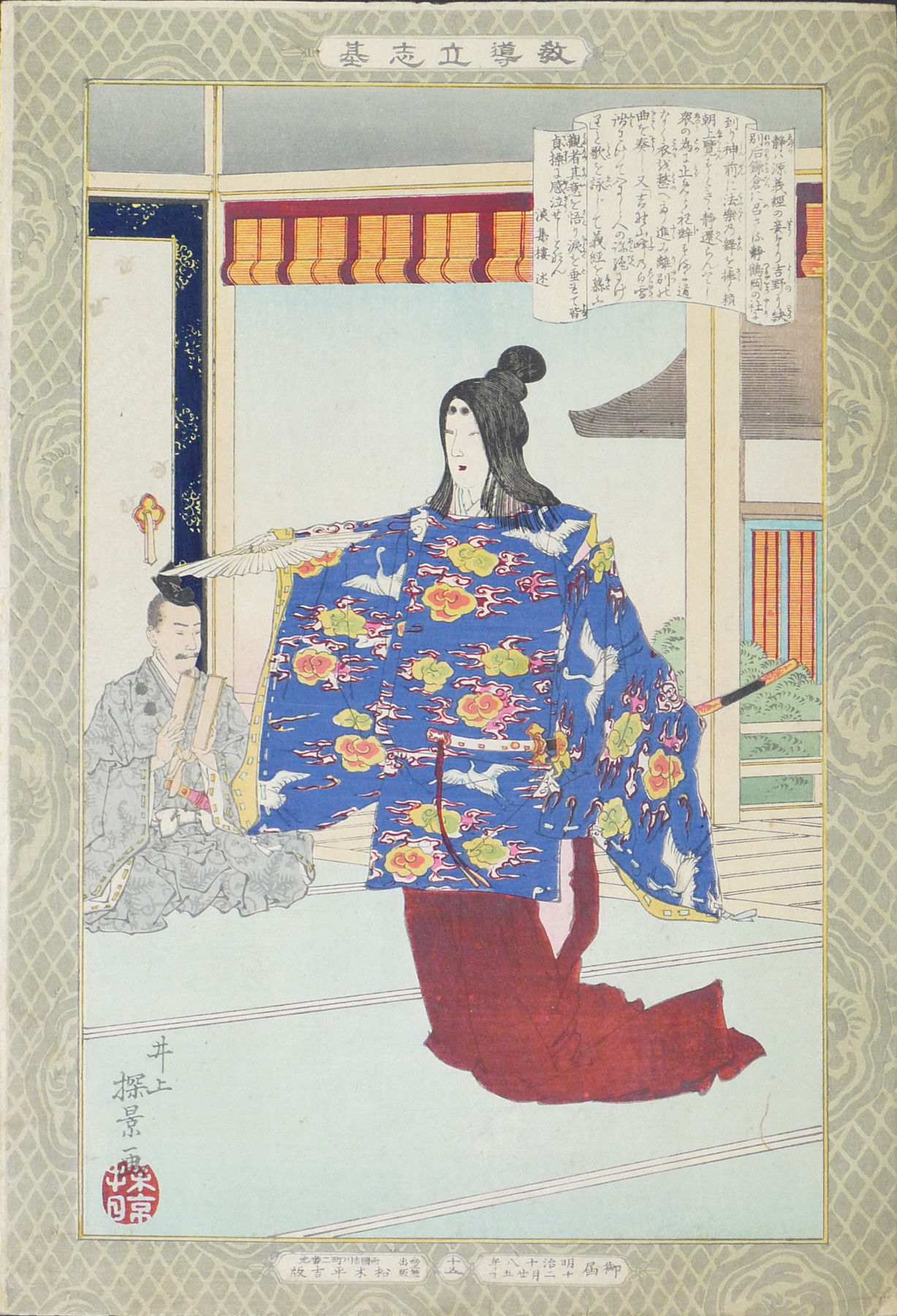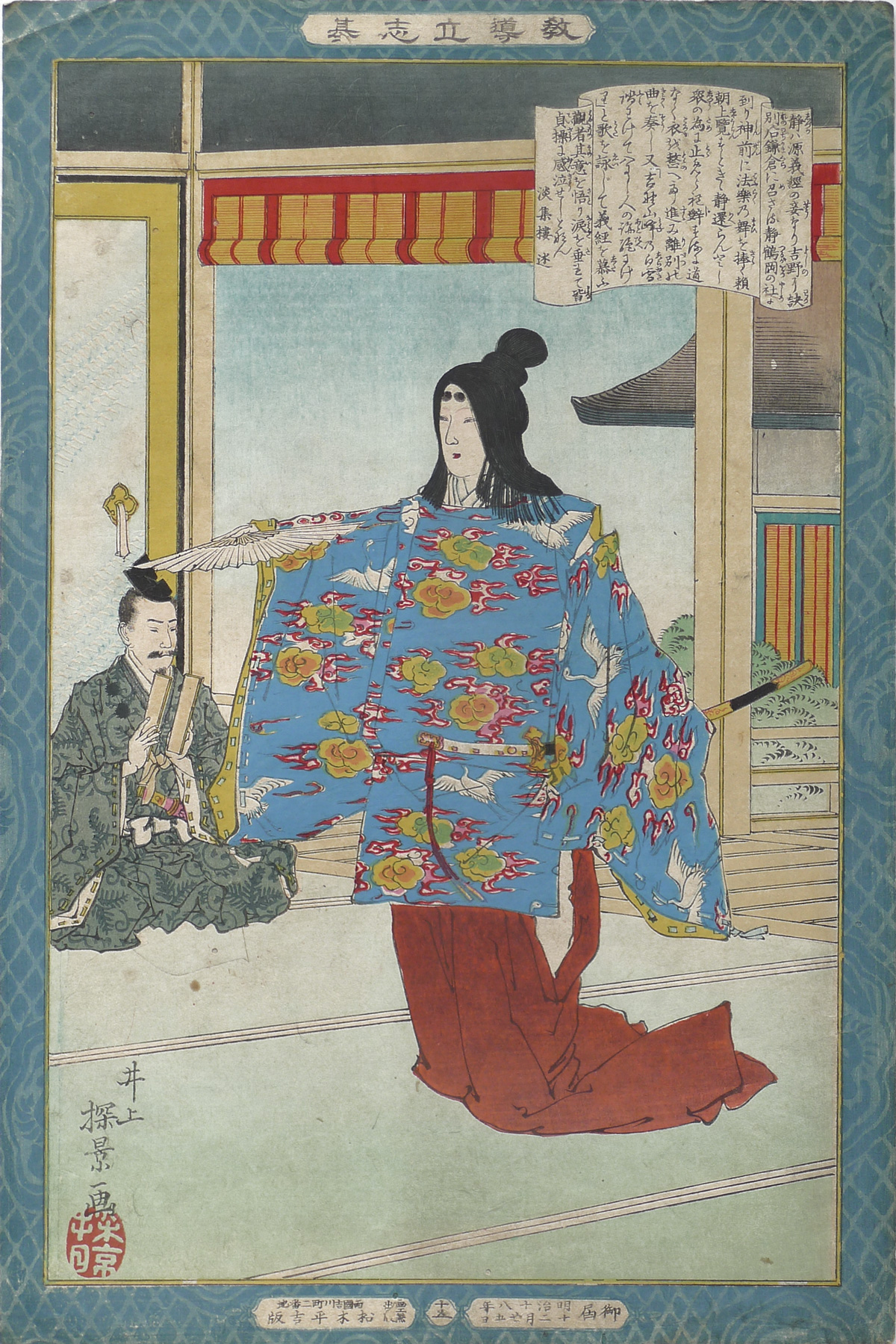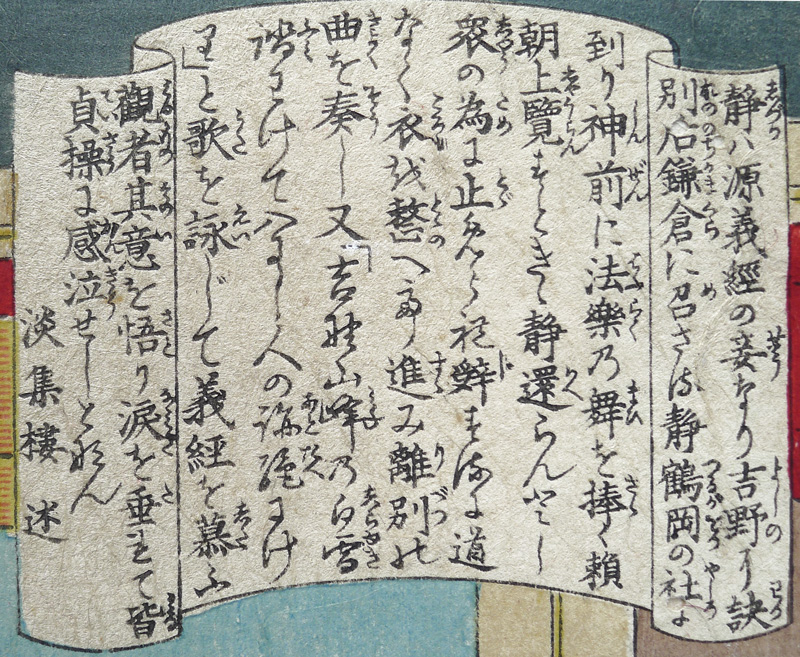About This Print
Print number 十五 (15)1 in the series Instructive Models of Lofty Ambition picturing Shizuka Gozen (静御前), a famous and beautiful shirabyōshi in the days of the Heian court, dancing in front of Minamoto no Yoritomo (源頼朝) in Tsurugaoka Hachiman-gū (鶴岡八幡宮) in Kamakura. Two different border colors and variations in image colorations are represented here. It is not definitively known if either border color indicates a first edition.Inoue, a student of Kobayashi Kiyochika, contributed thirteen prints to this series. He was to die at the age of 25 in 1889, four years after this print was issued.
1 Numbering of the prints was haphazard during the production of the series. Print numbers were sometimes inadvertently omitted; some prints in the series were never assigned numbers and a few of the same numbers appear on different prints.
The Story of Shizuka Gozen
Sources: Saitō Mussashi-bō Benkei. (Tales of the wars of the Gempei), James Seguin De Benneville, published by the author, 1910, p. 254.Shizuka is pregnant with the child of Minamoto no Yoshitsune (源義経), Yoritomo’s estranged brother and the first Kamakura shogun. Forced to perform for Yoritomo, she spites him by singing the praises of his brother and her longing for him. She sings:
On the peak of Yoshino-yama
Falls the white snow hiding all;
On this scene the wanderer enters,
Seeking trace of him she loves.
The winding, winding, of a trifling ball of yarn:
Thus feeble are my lowly wishes for his once-time
fortune.
In return, Yoritomo orders that Shizuka’s baby, if a boy, be murdered and that Shizuka also be killed.
Transcription of Scroll
click on scroll to enlarge
15 Shizuka Gozen 静御前
教導立志基 十五 静御前 井上探景(安治) 1885年12月25日
Transcription:
“静ハ源義經(義経)の妾なり 吉野の訣別后(わかれののち)鎌倉に召さる 静 鶴岡の社に到り神前に法樂(法楽)乃舞を捧ぐ 頼朝上覽(上覧)のときに静 還らんとし衆の為に止められ辞す時に道なく衣を整へて進み離別の曲を奏し又「吉野山 峰乃白雪踏わけて入にし人の跡絶にけり」と歌を詠じて義經を慕ふ 観者其意を悟り涙を垂れて皆貞操に感泣せしとなん 淡集樓 述”
About The Series "Kyōdō risshi no motoi"
Notes:1. This series is variously translated as "Instructive Models of Lofty Ambition," "Foundations of Learning and Achievement," "Foundation of Instruction and Perseverance," "Self-Made Men Worthy of Emulation," "Paragons of Instruction and Success," "Moral of Success," "Examples of Self-Made Leaders," and "Instruction in the Fundamentals of Success." The title in Japanese is sometimes seen as "Kyōdō risshiki or "Kyōdō risshi no moto," in addition to the most commonly seen transliteration of "Kyōdō risshi no motoi".2. For a complete listing of all the prints in the series and additional information please see the article on this site titled Instructive Models of Lofty Ambition.
This series ran between October 1885 and November 1890 and featured a long list of heroes and heroines, from antiquity to contemporary times, who were regarded as standards of moral leadership and self-realization.
Source: Kiyochika Artist of Meiji Japan, Henry D. Smith II, Santa Barbara Museum of Art, 1988, p. 74-75; original research and as footnoted.
This series of 58 prints,1 plus a table of contents sheet (目録), were originally published between October 1885 and November 1890 by the Tokyo publisher Matsuki Heikichi 松木平吉.2 The table of contents sheet issued by the publisher states that "fifty prints make up the complete set (五十番揃)". Three prints not in the initial release were added over the five year publication period, as were five redesigns of original prints, eventually increasing the total print count to 58. The seven artists contributing prints were Kobayashi Kiyochika (1847-1915) [20 prints], Mizuno Toshikata (1866-1908) [16 prints], Inoue Tankei (Yasuji) (1864-1889) [13 prints], Taiso (Tsukioka) Yoshitoshi (1839-1892) [5 prints], Yōshū Chikanobu (1838-1912) [2 prints], Toyohara Kunichika (1835–1900) [1 print], and Hachisuka (Utagawa) Kuniaki II (1835-1888) [1 print]. All the artists, with the exception of Yōshū Chikanobu, are listed in the top scroll of the table of contents sheet. Various colors (including blue, blue/green, and tan/brown) were used for the decorative border, and in 1902 the series was re-issued by Matsuki without borders.
Brief texts contained within a scroll-like cartouche appearing on each print provide historical details. The scroll composer's name is given at the end of the scroll text. The “lofty ambition” of the title is a Confucian concept, originally from Mencius, meaning “righteous determination that would inspire others.” The market for the series probably included former samurai, ambitious youth, and conservative intellectuals.
"[W]hen it was completed in 1890 the publisher was singled out for special recognition by the government for having sponsored such noble subject matter."3
This series ran between October 1885 and November 1890 and featured a long list of heroes and heroines, from antiquity to contemporary times, who were regarded as standards of moral leadership and self-realization.
Source: Kiyochika Artist of Meiji Japan, Henry D. Smith II, Santa Barbara Museum of Art, 1988, p. 74-75; original research and as footnoted.
This series of 58 prints,1 plus a table of contents sheet (目録), were originally published between October 1885 and November 1890 by the Tokyo publisher Matsuki Heikichi 松木平吉.2 The table of contents sheet issued by the publisher states that "fifty prints make up the complete set (五十番揃)". Three prints not in the initial release were added over the five year publication period, as were five redesigns of original prints, eventually increasing the total print count to 58. The seven artists contributing prints were Kobayashi Kiyochika (1847-1915) [20 prints], Mizuno Toshikata (1866-1908) [16 prints], Inoue Tankei (Yasuji) (1864-1889) [13 prints], Taiso (Tsukioka) Yoshitoshi (1839-1892) [5 prints], Yōshū Chikanobu (1838-1912) [2 prints], Toyohara Kunichika (1835–1900) [1 print], and Hachisuka (Utagawa) Kuniaki II (1835-1888) [1 print]. All the artists, with the exception of Yōshū Chikanobu, are listed in the top scroll of the table of contents sheet. Various colors (including blue, blue/green, and tan/brown) were used for the decorative border, and in 1902 the series was re-issued by Matsuki without borders.
This series of 58 prints,1 plus a table of contents sheet (目録), were originally published between October 1885 and November 1890 by the Tokyo publisher Matsuki Heikichi 松木平吉.2 The table of contents sheet issued by the publisher states that "fifty prints make up the complete set (五十番揃)". Three prints not in the initial release were added over the five year publication period, as were five redesigns of original prints, eventually increasing the total print count to 58. The seven artists contributing prints were Kobayashi Kiyochika (1847-1915) [20 prints], Mizuno Toshikata (1866-1908) [16 prints], Inoue Tankei (Yasuji) (1864-1889) [13 prints], Taiso (Tsukioka) Yoshitoshi (1839-1892) [5 prints], Yōshū Chikanobu (1838-1912) [2 prints], Toyohara Kunichika (1835–1900) [1 print], and Hachisuka (Utagawa) Kuniaki II (1835-1888) [1 print]. All the artists, with the exception of Yōshū Chikanobu, are listed in the top scroll of the table of contents sheet. Various colors (including blue, blue/green, and tan/brown) were used for the decorative border, and in 1902 the series was re-issued by Matsuki without borders.
Brief texts contained within a scroll-like cartouche appearing on each print provide historical details. The scroll composer's name is given at the end of the scroll text. The “lofty ambition” of the title is a Confucian concept, originally from Mencius, meaning “righteous determination that would inspire others.” The market for the series probably included former samurai, ambitious youth, and conservative intellectuals.
"[W]hen it was completed in 1890 the publisher was singled out for special recognition by the government for having sponsored such noble subject matter."3
1 The Tokyo Metropolitan Library online collection shows 50 prints and a Table of Contents sheet. The Table of Contents lists the titles of 50 prints. Smith in Kiyochika Artist of Meiji Japan identified 52 prints. I have identified 58 prints from this series including five prints (Ikina, Michizane Sugiwara, Kesa Gozen, Soga Brothers and Hokiichi Hanawa) that were re-designed and re-printed, likely due to damaged or lost blocks.
2 Robert Schaap notes in Appendix II, p. 166 of Yoshitoshi, Masterpieces from the Ed Freis Collection, Chris Uhlenbeck and Amy Reigle Newland, Hotei Publishing, 2011 that the series originally appeared as newspaper supplements.
3 The World of the Meiji Print: Impressions of a New Civilization, Julia Meech-Pekarik, Weatherhill, 1986, p. 122.
1 The Tokyo Metropolitan Library online collection shows 50 prints and a Table of Contents sheet. The Table of Contents lists the titles of 50 prints. Smith in Kiyochika Artist of Meiji Japan identified 52 prints. I have identified 58 prints from this series including five prints (Ikina, Michizane Sugiwara, Kesa Gozen, Soga Brothers and Hokiichi Hanawa) that were re-designed and re-printed, likely due to damaged or lost blocks.
2 Robert Schaap notes in Appendix II, p. 166 of Yoshitoshi, Masterpieces from the Ed Freis Collection, Chris Uhlenbeck and Amy Reigle Newland, Hotei Publishing, 2011 that the series originally appeared as newspaper supplements.
3 The World of the Meiji Print: Impressions of a New Civilization, Julia Meech-Pekarik, Weatherhill, 1986, p. 122.
Print Details
| IHL Catalog | #676 and #757 |
| Title or Description | Shizuka Gozen 静御前 |
| Series | “Instructive Models of Lofty Ambition” (Kyodo risshiki 教導立志基) [note: seriestitle also listed as 'Kyodo Risshi no Moto', ‘Kyodo risshi no motoi’,‘Kyōdō risshi ki’ and variously translated as “Moral of success” or“Foundations of learning and achievement” or “Self-made Men Worthy ofEmulation”' or “Examples of Self-made Leaders” or "Paragons of instruction and success"] |
| Artist | Inoue Yasuji (1864-1889) |
| Signature |  |
| Seal |  |
| Publication Date | December 25, 1885 明治十八年 十二月 廿五日 |
| Publisher | Matsuki Heikichi (松木平吉) proprietor of Daikokuya Heikichi [Marks: seal not shown; pub. ref. 029] IHL Cat. #676 click on image to enlarge IHL Cat. #757 click on image to enlarge (from right to left) publishing and printing date: 御届 明治十八年 十二月 廿五日 [notification delivered, Meiji 18 12th month 25th day] assigned number within series: 十五 [15] publisher information: 画工兼 出版 両国吉川町二番地 松木平吉 版 [artist and publisher Ryōgoku Yoshikawachō 2-banchi Matsuki Heikichi han] |
| Impression | excellent |
| Colors | excellent |
| Condition | IHL Cat. #676: good - full size; not backed; minor soiling; wrinkling along bottom of print IHL Cat. #757: good - trimmed to decorative border; minor soiling; multiple small wholes repaired from back; not backed |
| Genre | ukiyo-e; rishki-e; kyōiku nishiki-e |
| Miscellaneous | print number 15 (十五); position 15 in the Table of Contents for the series |
| Format | vertical oban |
| H x W Paper | IHL Cat. #676: 14 3/8 x 9 3/4 in. (36.5 x 24.8 cm) IHL Cat. #757: 13 7/8 x 9 1/8 in. (35.2 x 23.2 cm) |
| Literature | |
| Collections This Print | British Museum 1906,1220,0.1821; The Tsubouchi Memorial Theatre Museum of Waseda University 012-0961 (color variant edition); Tokyo Metropolitan Library 270-K008; Art Research Center, Ritsumeikan University ARC mai06d09 |




